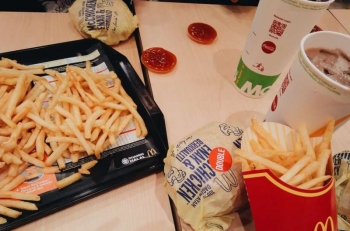Junk food orders up trouble for young brains

Adolescents' brains are more sensitive to the rewarding properties of junk foods; but they lack the control mechanisms to prevent themselves from eating them.
FAB RESEARCH COMMENT:
Adolescence is a period of major brain and behavioural changes that can make teenagers particularly susceptible to the lure of so-called 'junk foods' (which are not only available almost everywhere, but are also heavily marketed to this age group).As this new review explains, consuming these highly palatable, ultra-processed foods in significant quantities can compromise brain as well as body health, further undermining both teenagers' emotional stability, and their ability to make rational decisions.
The brain's frontal lobes - involved in 'executive functions' like the ability to resist impulse, plan ahead, weigh up actions and their consequences, and regulate behaviour accordingly - do not fully mature until around age 25
The authors emphasise that teenagers need appropriate information and support to prevent them from being caught up in a 'vicious cycle', in which poor eating habits and difficulties with emotional regulation and impulsivity during this critical period of brain development become established patterns that are 'hardwired' - and therefore much more difficult to modify.
For details of this research, see:
See here for more articles on the effects of junk food on young brains and mental health.
10 March 2020 - MedicalXpress
-----------------------------------
That teenager in your kitchen feasting on fast food, candy bars and pop might not be able to help themselves—all the more reason for adults to help them before they cause long-term damage to their developing brains.
In a new study, Western researchers Cassandra Lowe, J. Bruce Morton and Amy Reichelt highlighted adolescence as a period of "dual susceptibility."
While teen brains are still developing decision-making capabilities, their limited restraint and heightened reward system make them more prone to eating poorly, which in turn may lead to negative changes in the brain.
These findings, according to researchers, show the importance of changing behaviors and helping adolescents form healthy habits early on to minimize these changes.
The study, Adolescent obesity and dietary decision making—a brain-health perspective, was published today in The Lancet Child and Adolescent Health.
"Adolescents are more prone to eating calorie-dense, high-sugar foods because they lack the control to regulate it," said Lowe, a BrainsCAN postdoctoral scholar. "Their brain is still maturing so they're more sensitive to the rewarding properties of these foods. But, at the same time, they lack the control mechanisms to prevent themselves from eating junk foods."
During adolescence, the prefrontal cortex—involved in self-regulation, decision-making and reward-seeking—is developing, making it difficult for teenagers to resist unhealthy foods. Until this area of the brain matures, adolescents are more likely to take part in impulsive and reward-seeking activities.
"The prefrontal cortex is the last area of the brain to develop. It's the part of the brain that is critical for behavioral regulation; it's the manager of the brain," said Reichelt, a BrainsCAN postdoctoral scholar.
"The teenage brain has a triple-vulnerability—a heightened drive for rewards, reduced self-regulation abilities and susceptibility to be changed by environmental factors—including junk foods."
Over time, the excessive consumption of calorie-dense foods can lead to changes in the structure and function of the prefrontal cortex, including altering dopamine signaling and inhibition. The neurotransmitter dopamine is released when the brain's reward system is activated. It can be activated by natural rewards, such as social interaction, as well as eating calorie-dense foods.
"If a behavior is rewarding, dopamine makes us want to carry out that behavior again," Reichelt added. "Adolescents have increased numbers of dopamine receptors in the brain, so when they do experience something rewarding, that experience of reward and how the brain processes it is heightened compared to that of an adult."
As adolescents overstimulate their reward systems, these unhealthy diets can result in poor cognitive control and heightened impulsivity as they move into adulthood. This demonstrates the importance of changing behaviors and helping adolescents form healthy habits early on to minimize changes to the brain.
"One avenue we really need to look into is the use of exercise as a way of regulating changes in the brain that can help us make better dietary choices," Lowe said. "There's evidence that exercise can help improve the brain in terms of cognitive control, but also reduce reward sensitivity to things like food items."
"Teenagers don't want to be told what to do—they want to be able to make their own informed choices," Reichelt said.
"If you provide them with easily understandable information about how their diet is affecting their brain, while providing them with other alternative behaviors, that's going to help them in maintaining healthy lifestyle practices long term."
